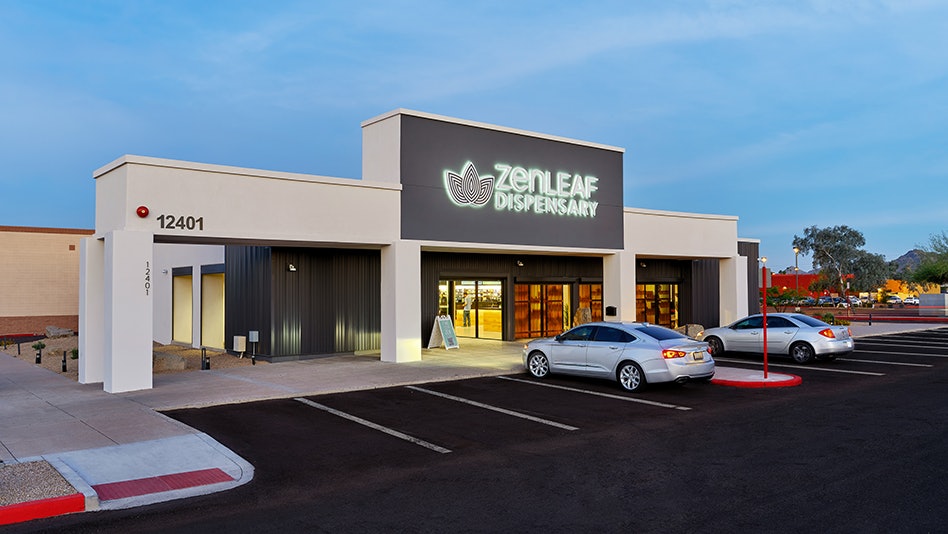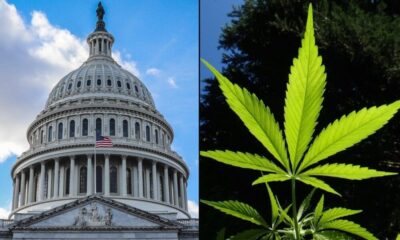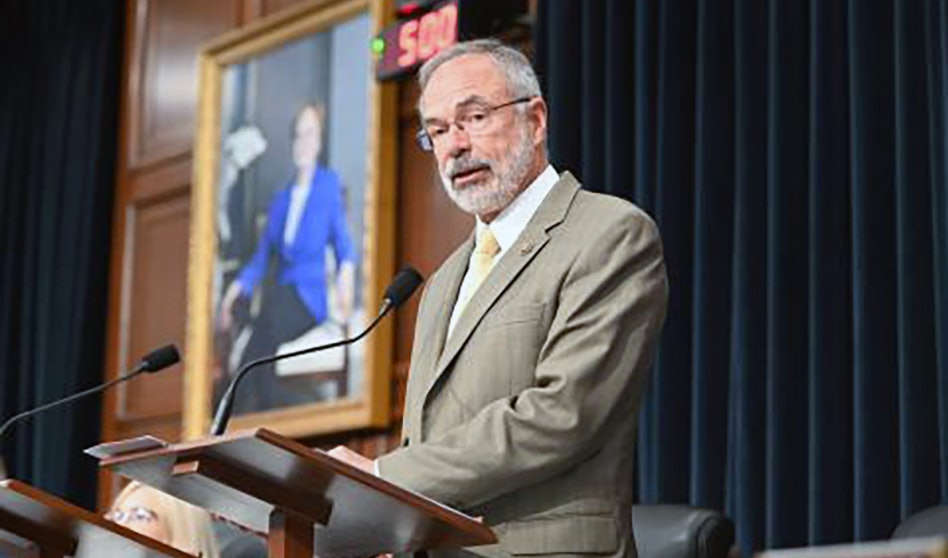featured
Verano Unveils Bodega-Style Dispensary Experience at Zen Leaf Cave Creek in Phoenix
Published
12 hours agoon

- Verano will explore scaling the new bodega-style dispensary experience across the company’s entire Arizona retail footprint and will offer third-party wholesale partners in-store activation opportunities in the near future.
- The company’s vertical Arizona operations consist of multiple cultivation and processing facilities and eight retail dispensaries, including Zen Leaf locations in Arcadia, Chandler, Gilbert, Mesa, Phoenix-Cave Creek and Phoenix-West Dunlop, and Cannabist-branded outlets in Prescott and Tempe.
- Verano’s active operations span 13 states, comprising 157 dispensaries and 15 cultivation and processing facilities with more than 1.1 million square feet of cultivation capacity.
[PRESS RELEASE] – CHICAGO, June 25, 2025 – Verano Holdings Corp., a leading multistate cannabis company, announced the unveiling of a new dispensary format that aims to revolutionize the traditional cannabis retail experience. The new bodega-style model—debuting at Verano’s Zen Leaf Phoenix-Cave Creek dispensary at 12401 N Cave Creek Road in Phoenix—provides visitors with a unique opportunity to browse, interact with, and choose their favorite items throughout the store, offering unparalleled convenience and a modern retail experience historically unavailable for cannabis shoppers.
Verano will welcome guests to experience the new bodega-style dispensary during a grand reopening Zen Leaf Summer Festival weekend celebration June 27-28 at Zen Leaf Cave Creek, featuring giveaways for the first 50 customers each day, meet-and-greets with rap icons Dizzy Wright and Devin the Dude, product deals and discounts, DJs spinning tunes, local artisan pop-ups, food trucks, and more. Zen Leaf Cave Creek is open every day from 8 a.m. to 10 p.m.
Zen Leaf Cave Creek’s transformation offers customers unrivaled convenience, accessibility and the freedom to choose their desired shopping experience. Customers who prefer to shop via the new bodega-style format can hand-select their favorite items from category-specific shelves, including “Flower,” “Vapes,” “Edibles,” “Best Sellers,” “Accessories” and more, with Zen Leaf experts available to offer guidance along the way.
“The dynamic cannabis landscape requires constant innovation and differentiation to push the boundaries of possibility, and today’s unveiling of a completely new dispensary shopping experience at Zen Leaf Cave Creek delivers on that mission,” said Robert Cohen, Verano executive vice president of retail strategy. “I’m proud of our team for bringing forth a vision that has the potential to create an entirely new paradigm for cannabis retail offering unrivaled convenience and consumer choice, and we look forward to welcoming Zen Leaf guests to browse one of the largest accessible assortments of legal cannabis in the nation.”
With the debut of the bodega-style format, Zen Leaf shoppers now have unprecedented freedom and the opportunity to purchase their favorite cannabis products in their preferred manner via traditional and new methods, including self-selecting from shelves, online pre-orders, in-store kiosks, in-person counter service and the debut of curbside pickup service. Verano will also introduce in-store third-party activation opportunities for wholesale partners to provide additional product variety and engagement for Zen Leaf shoppers in the near future.
Along with its eight statewide dispensaries, Verano’s Arizona footprint includes 90,000 square feet of state-of-the-art cultivation and processing operations, where the company produces its portfolio of award-winning brands including Verano Reserve flower, Swift Lift pre-roll joints and vapes; (the) Essence and Savvy flower, edibles and vapes; On the Rocks Live Rosin vapes and extracts; BITS low-dose, high-function edibles; Hi-Klas flower, extracts and vapes; Vital edibles and tinctures; and MÜV transdermal patches and topicals.
For more information and to place online orders, visit ZenLeafDispensaries.com.

Author: mscannabiz.com
MScannaBIZ for all you Mississippi Cannabis News and Information.
You may like
-


Rand Paul Files Bill To Triple Federal THC Limit For Hemp As House Pursues Crackdown On Consumable Cannabinoids
-


Marketshare of cannabis sleep aids skyrockets
-


US House Committee Approves Bill to Close THCA ‘Loophole,’ Ban Intoxicating Hemp Products
-


House Votes To Let VA Doctors Recommend Medical Marijuana To Military Veterans And To Support Psychedelics Research
-


World-Class Growing Solutions | Cannabis Business Times
-


Summers are better with Flav
featured
Rand Paul Files Bill To Triple Federal THC Limit For Hemp As House Pursues Crackdown On Consumable Cannabinoids
Published
30 minutes agoon
June 25, 2025
As the hemp industry raises concerns about congressional attempts to ban most consumable cannabinoid products, a GOP senator has filed a bill that would triple the concentration of THC that the crop could legally contain, while addressing multiple other concerns the industry has expressed about federal regulations.
Sen. Rand Paul (R-KY) introduced the legislation, titled the Hemp Economic Mobilization Plan (HEMP) Act, last week. It mirrors versions he’s sponsored over the last several sessions.
Hemp and its derivatives were legalized under the 2018 Farm Bill, but the industry has experienced multiple setbacks in the years since—and the proliferation of intoxicating cannabinoid products has led to pushes in Congress and state legislatures across the country to reign in the largely unregulated market.
To that point, a GOP-led House committee this week approved a spending bill containing provisions that hemp stakeholders say would devastate the industry, prohibiting most consumable cannabinoid products that were federally legalized during the first Trump administration.
The legislation would “effectively” criminalize hemp-derived cannabinoid products, including CBD, according to a Congressional Research Service (CRS) report.
In contrast, the newly reintroduced measure from Paul would address one of the most common complaints that lawmakers have heard from hemp businesses under the current law, which is that the crop is federally defined as containing no more than 0.3 percent THC by dry weight. They say that’s too low, and so the bill would increase that threshold to 1 percent.
It would also address potential problems with testing requirements under U.S. Department of Agriculture (USDA) regulations. Hemp processors currently get a 15-day window to test the crop’s flower to ensure that the THC concentration is within the allowed limits. But testing flower can be onerous and farmers have said it would stretch their resources thin, not to mention that the plant’s THC is significantly impacted by external factors.
To fix that issue, the bill calls for final hemp products themselves to be tested, rather than the initial flower from the plant.
The legislation also sets documentation requirements for people transporting hemp shipments, intended to prevent further instances of law enforcement seizing the legal crop, believing it to be illicit marijuana. The bill expands the type of documentation that people could possess to demonstrate product legality.
Whereas the initial version of Paul’s measure filed in 2020 would have required them to carry a certificate from a lab demonstrating that the product contains no more than 1 percent THC, they could now instead choose to simply bring a copy of the hemp producer’s license.
While stakeholders would welcome the senator’s proposal, there’s also significant anxiety within the industry about the separate legislation that would significantly upend the hemp market that’s developed over the last several years.
While report language attached to the 2026 appropriations bill was recently amended to clarify lawmakers’ intent not to disrupt the non-intoxicating cannabinoid market—signaling that products like CBD shouldn’t be banned—the legislation itself hasn’t changed and could still jeopardize the industry without further amendments to its provisions.
Hemp industry stakeholders rallied against that proposal, an earlier version of which was also included in the base bill from the subcommittee last year. It’s virtually identical to a provision of the 2024 Farm Bill that was attached by a separate committee last May via an amendment from Rep. Mary Miller (R-IL), which was also not enacted into law.
A leading alcohol industry association, meanwhile, has called on Congress to dial back language in the House spending bill that would ban most consumable hemp products, instead proposing to maintain the legalization of naturally derived cannabinoids from the crop and only prohibit synthetic items.
Members of Wine & Spirits Wholesalers of America (WSWA) also met with lawmakers and staffers in April to advocate for three key policy priorities that the group says is based on “sound principles of alcohol distribution.” They include banning synthetic THC, setting up a federal system for testing and labeling products and establishing state-level power to regulate retail sales.
Separately, key GOP congressional lawmakers—including one member who supports marijuana legalization—don’t seem especially concerned about provisions in the new spending bill that would put much of the hemp industry in jeopardy by banning most consumable products derived from the plant.
—
Marijuana Moment is tracking hundreds of cannabis, psychedelics and drug policy bills in state legislatures and Congress this year. Patreon supporters pledging at least $25/month get access to our interactive maps, charts and hearing calendar so they don’t miss any developments.![]()
Learn more about our marijuana bill tracker and become a supporter on Patreon to get access.
—
Jonathan Miller, general counsel of the U.S. Hemp Roundtable, told congressional lawmakers in April that the market is “begging” for federal regulations around cannabis products.
At the hearing, Rep. James Comer (R-KY) also inquired about FDA inaction around regulations, sarcastically asking if it’d require “a gazillion bureaucrats that work from home” to regulate cannabinoids such as CBD.
A report from Bloomberg Intelligence (BI) last year called cannabis a “significant threat” to the alcohol industry, citing survey data that suggests more people are using cannabis as a substitute for alcoholic beverages such a beer and wine.
Last November, meanwhile, a beer industry trade group put out a statement of guiding principles to address what it called “the proliferation of largely unregulated intoxicating hemp and cannabis products,” warning of risks to consumers and communities resulting from THC consumption.
Read the text of the HEMP Act below:
Photo courtesy of Max Pixel.

Author: mscannabiz.com
MScannaBIZ for all you Mississippi Cannabis News and Information.
featured
US House Committee Approves Bill to Close THCA ‘Loophole,’ Ban Intoxicating Hemp Products
Published
2 hours agoon
June 25, 2025
U.S. House Republicans advanced what many view as a hemp-killing provision in a must-pass appropriations bill for fiscal year 2026.
The House Appropriations Committee voted along party lines, 35-27, on June 23 to approve the Agriculture, Rural Development, Food and Drug Administration, and Related Agencies Appropriations Bill. The 138-page spending bill includes more than $25 billion in discretionary allocations to address myriad issues facing U.S. farmers, ranchers and rural communities.
In addition to focusing on America’s food and drug supply, this year’s bill also includes language to rewrite the rules around hemp-derived cannabinoid products. The provision aims to address what elected officials and law enforcement groups nationwide have increasingly viewed as a public health and safety concern in the aftermath of the 2018 Farm Bill’s federal legalization of industrial hemp cultivation. The 2018 Farm Bill regulates hemp as an agricultural commodity but not finished goods containing the plant’s derivatives.
Under the Appropriation Committee’s fiscal 2026 legislation, hemp-derived cannabinoid products containing synthetic compounds and/or quantifiable amounts of THC or THCA—or other cannabinoids that have similar effects on humans or animals—would be illegal.
When the legislation first advanced through the House Subcommittee on Agriculture, Rural Development, Food and Drug Administration (FDA), on June 5, Rep. Andy Harris, R-Md., said he was hoping to close the “hemp loophole” in the 2018 Farm Bill that has resulted in the proliferation of intoxicating cannabinoid products, such as those that contain delta-8 THC.
Harris, who chairs the subcommittee, provided similar opening remarks for the full committee markup that followed.
“As many states have stepped in to curb these dangerous products from reaching consumers, particularly children, it’s time for Congress to act to close this loophole while protecting the industrial hemp industry,” Harris said. “Reports that the included language would destroy legitimate businesses are simply not true—and that is clear to anyone closely reading the carefully drafted language that threaded the needle.”
The U.S. Hemp Roundtable accused Harris earlier this month of “reviving his crusade” to “quietly” dismantle the hemp industry by burying language on page 113 of the proposed spending bill that would redefine hemp in a way that would “ban the vast majority of safe, legal hemp-derived products sold nationwide.”
The industry advocacy organization contended that the bill’s inclusion of language to prohibit products with “quantifiable amounts” of THC or THCA would also effectively ban most nonintoxicating CBD products.
Renée Johnson, a specialist in agricultural policy with the nonpartisan Congressional Research Service (CRS), authored a June 13 report on the appropriations bill that backed that claim, writing that “excluding hemp-derived cannabinoid products from the federal definition of hemp effectively would prohibit production and sale of hemp-derived cannabinoids, derivatives, and extracts thereof, including cannabidiol (CBD).”
However, an updated version of Johnson’s CRS report was published on June 20 to exclude any mention of CBD.
Manufacturing hemp products with a purified CBD isolate that filters out even trace amounts of THC is a much more expensive process: Under the 2018 Farm Bill, hemp can contain up to 0.3% delta-9 THC on a dry-weight basis during a pre-harvest field test. But eliminating that potency threshold would change the compliance rules on finished goods.
The House Appropriations Committee approved a manager’s amendment (from Harris) on June 11, clarifying that in “determining the quantifiable amounts, the committee does not intend for industrial or nonintoxicating, hemp-derived cannabinoid products with trace or insignificant amounts of THC to be affected.”
The legislation authorizes the U.S. Secretary of Health and Human Services to determine what qualifies as “quantifiable amounts” of THC or other cannabinoids. In addition, industrial hemp grown for fiber, grain or other non-cannabinoid purposes would be defined separately.
While thousands of U.S. businesses have become dependent on manufacturing, distributing and selling consumable products containing intoxicating hemp derivatives, not all industry associations necessarily disagree with the intent of the appropriations bill.
The American Trade Association of Cannabis and Hemp (ATACH) stands on the principle that intoxicating products should be regulated when available for consumers to improve public safety and promote growth for the cannabis industry.
“The 2018 Farm Bill set the stage for the proliferation of synthetic THC products,” ATACH President Michael Bronstein said in a June 23 statement provided to Cannabis Business Times. “Today’s action by the House Appropriations Committee is an important first step toward addressing the risks posed by synthetic THC products, creating clear regulatory lanes for hemp-derived products, and resolving legal loopholes.
“Congress must confront the dangers of chemically converted synthetic THC products, safeguard CBD, and create parity across natural THC products regardless of origin. We look forward to continuing to work with Congress to create a unified federal framework for all natural THC products.”
Harris also included similar hemp language in his subcommittee’s draft of the fiscal 2025 agriculture/FDA spending bill, but it was later removed from last year’s appropriations package.
This year’s rendition is now being prepared to arrive on the House floor.

Author: mscannabiz.com
MScannaBIZ for all you Mississippi Cannabis News and Information.
featured
House Votes To Let VA Doctors Recommend Medical Marijuana To Military Veterans And To Support Psychedelics Research
Published
3 hours agoon
June 25, 2025
The U.S. House of Representatives has approved amendments to a spending bill that would authorize U.S. Department of Veterans Affairs (VA) doctors to issue medical marijuana recommendations to military veterans and support psychedelics research and access.
Two days after the House Rules Committee made the cannabis and psychedelics amendments in order for floor consideration, the full chamber agreed to attach them to the Military Construction, Veterans Affairs and Related Agencies (MilConVA) appropriations legislation on Wednesday.
One of the accepted proposals from Reps. Brian Mast (R-FL) and Dave Joyce (R-OH)—who are both co-chairs of the Congressional Cannabis Caucus—would increase veterans’ access to state medical marijuana programs and eliminate a current VA directive barring the department’s doctors from issuing cannabis recommendations.
Here’s the text of the amendment:
“None of the funds appropriated or otherwise made available to the Department of Veterans Affairs in this Act may be used to enforce Veterans Health Directive 1315 as it relates to—
(1) the policy stating that ‘VHA providers are prohibited from completing forms or registering Veterans for participation in a State-approved marijuana program’;
(2) the directive for the ‘Deputy Under Secretary for Health for Operations and Management’ to ensure that ‘medical facility Directors are aware that it is VHA policy for providers to assess Veteran use of marijuana but providers are prohibited from recommending, making referrals to or completing paperwork for Veteran participation in State marijuana programs’; and
(3) the directive for the ‘VA Medical Facility Director’ to ensure that ‘VA facility staff are aware of the following’ ‘[t]he prohibition recommending, making referrals to or completing forms and registering Veterans for participation in State-approved marijuana programs’.”
The provision—which passed on a voice vote—is based on a standalone bill, the Veterans Equal Access Act, which Mast refiled in February. That marked one of the latest attempt to enact the measure that’s enjoyed bipartisan support over recent sessions but has yet to become law. It’s advanced several times in committee and on the floor but has yet to be enacted into law.
Adopted by voice vote.
— House Appropriations Amendments (@AppropsAmendmts) June 25, 2025
After sharing his own experience with conventional medications following a serious injury during his time in military service, Mast said that, “in many cases” those drugs “leave our veterans in are, at the most extreme end of it, states of suicide. At other ends of it, just extreme states of dissatisfaction and lacking purpose in life. And in some cases, it does leave them in a better condition.”
“Veterans need to have options outside of these narcotics, and in many states, there are legal cannabis medical programs, and they need to have the ability when they’re being seen by their primary care physician inside of the VA to have discussions about whether cannabis is or is not right for them because they have access to it in their state,” Mast said.
In past years, both the House and Senate have included provisions in their respective MilConVA measures that would permit VA doctors to make the medical cannabis recommendations, but they have never been enacted into law.
Another MilConVA provision attached to the House bill this year, from Reps. Lou Correa (D-CA) and Jack Bergman (R-MI), would encourage VA to support research into the benefits of psychedelics in treating medical conditions commonly affecting military veterans.
Here’s the summary of the amendment:
“Increases and decreases funding for the Medical and Prosthetic Research account at the Department of Veterans Affairs to direct the Department to evaluate and make recommendations on changes that would need to be made to its existing healthcare infrastructure to integrate approved psychedelic therapies into veterans’ care options for conditions such as PTSD and substance use disorders. This would include the need for supporting the development and dissemination of training and supervision programs for providers and pilot programs to inform clinical implementation of these therapies.”
The House approved the psychedelics measure on a voice vote.
Correa said on the floor that he and Bergman are “encouraged by the promising results so far that we have seen in treating veterans with PTSD and other disorders” by utilizing psychedelics.
“However, these therapies are different from traditional therapies in many ways,” the congressman said. “Psychedelic therapies involve long-hour sessions with multiple therapists, additional safety issues and special training consideration for providers. We introduce this amendment because we need to be ready and be proactive to make sure that when the VA is ready to administer these therapies, they actually can.”
Bergman said that “Washington, D.C. has built its success on good partnerships, especially across the aisle, on issues that benefit all of our Americans, not just a few,” and that’s what the amendment accomplishes.
“Without a plan to turn findings into frontline care, we risk failing the very people this research is meant to help our veterans,” he said. “We know the stakes. Too many service members come home bearing invisible wounds. While traditional treatments work for some, far too many are left cycling through ineffective medications, suffering in silence or worse.”
Adopted by voice vote.
— House Appropriations Amendments (@AppropsAmendmts) June 25, 2025
“This amendment sends a clear message to the VA: Don’t just study, prepare,” Bergman said. “We owe our veterans more than research we owe them results. We owe them implementation, and this amendment moves us one step closer to delivering that.”
There were notably fewer cannabis-related amendments filed for the MilConVA bill this year compared to past sessions, though the Rules Committee has previously rejected several of those other Democratic-led reforms such as blocking cannabis testing for federal job applicants in states that have enacted legalization.
—
Marijuana Moment is tracking hundreds of cannabis, psychedelics and drug policy bills in state legislatures and Congress this year. Patreon supporters pledging at least $25/month get access to our interactive maps, charts and hearing calendar so they don’t miss any developments.![]()
Learn more about our marijuana bill tracker and become a supporter on Patreon to get access.
—
Meanwhile, on Monday, the House Appropriations Committee approved a separate spending bill containing provisions that hemp stakeholders say would devastate the industry, prohibiting most consumable cannabinoid products that were federally legalized during the first Trump administration.
Also, earlier this month, Congress passed a bill that is primarily focused on permanently banning analogues of fentanyl, though it also contains provisions that one GOP lawmaker said would remove barriers to conducting research into the risks and benefits of marijuana and other Schedule I drugs.
Congressional Committee Approves Federal Hemp THC Ban That Stakeholders Say Would Decimate Industry

Author: mscannabiz.com
MScannaBIZ for all you Mississippi Cannabis News and Information.
Rand Paul Files Bill To Triple Federal THC Limit For Hemp As House Pursues Crackdown On Consumable Cannabinoids

Marketshare of cannabis sleep aids skyrockets

US House Committee Approves Bill to Close THCA ‘Loophole,’ Ban Intoxicating Hemp Products

House Votes To Let VA Doctors Recommend Medical Marijuana To Military Veterans And To Support Psychedelics Research

World-Class Growing Solutions | Cannabis Business Times

Summers are better with Flav

Nebraska Medical Cannabis Commission Proposal Will ‘Destroy Patient Access,’ Advocates Say

Circuit Court Ruling for Arkansas Renders Texas Governor’s Hemp Veto Argument Moot

Jones Soda Co. Sells Mary Jones THC Beverage Brand

Feds Say Tourist Who Admitted To Prior Marijuana Use In Legal Places Was Denied Entry To US Over Drugs—Not Bald JD Vance Meme

The PFAS Threat in Cannabis and Hemp: What You Need to Know

Chicago Police Can’t Search Vehicles Based on Smell of Raw Cannabis Under New Rules

Marijuana Opponents ‘Have Lost’ The Debate, GOP Senator Says, Arguing ‘It’s Time’ To Regulate It Like Alcohol And Tobacco

How much do you know about Pennsylvania’s medical marijuana program? Take our quiz.

Verano Unveils Bodega-Style Dispensary Experience at Zen Leaf Cave Creek in Phoenix

Congress to vote on cannabis & psychedelics amendments this week (Newsletter: June 25, 2025)

Rockford teen intended to deliver 300+ grams of cannabis, police say

El Paso cannabis shops relieved after Gov. Abbott vetoes ban on THC products

More older adults are using cannabis, study says

Marijuana use rising among seniors, and doctors are sounding alarms

More older Americans are using marijuana, according to new data

With Texas Hemp Ban Now Vetoed By Governor, Industry And Lawmakers Turn To Regulation

House To Vote On Letting VA Doctors Recommend Medical Marijuana To Military Veterans And Supporting Psychedelics Research

Montana Governor Rejects Bill To Let Tribes Negotiate Marijuana Regulations With State

Alert: Department of Cannabis Control updates data dashboards with full data for 2023

Connecticut Appoints The US’s First Cannabis Ombudsperson – Yes there is a pun in there and I’m Sure Erin Kirk Is Going To Hear It More Than Once!

5 best CBD creams of 2024 by Leafly

Free delta-9 gummies from Bay Smokes
New Study Analyzes the Effects of THCV, CBD on Weight Loss

EU initiative begins bid to open access to psychedelic therapies

Mississippi city official pleads guilty to selling fake CBD products

May 2024 Leafly HighLight: Pink Runtz strain

Curaleaf Start Process Of Getting Their Claws Into The UK’s National Health System – With Former MP (Resigned Today 30/5/24) As The Front Man

5 best autoflower seed banks of 2024 by Leafly

Horn Lake denies cannabis dispensary request to allow sale of drug paraphernalia and Sunday sales | News

Discover New York’s dankest cannabis brands [September 2024]

Nevada CCB to Accept Applications for Cannabis Establishments in White Pine County – “Only one cultivation and one production license will be awarded in White Pine County”

Press Release: CANNRA Calls for Farm Bill to Clarify Existing State Authority to Regulate Hemp Products

Local medical cannabis dispensary reacts to MSDH pulling Rapid Analytics License – WLBT

6 best CBD gummies of 2024 by Leafly

5 best THC drinks of 2024 by Leafly

The Daily Hit: October 2, 2024

5 best delta-9 THC gummies of 2024 by Leafly

People In This State Googled ‘Medical Marijuana’ The Most, Study Shows

Weekly Update: Monday, May 13, 2024 including, New Guide for Renewals & May Board meeting application deadline

Thailand: Pro-cannabis advocates rally ahead of the government’s plan to recriminalize the plant

PRESS RELEASE : Justice Department Submits Proposed Regulation to Reschedule Marijuana

Press Release: May 9, STIIIZY and Healing Urban Barrios hosted an Expungement Clinic & Second Chance Resource Fair
Trending
-

 California Cannabis Updates1 year ago
California Cannabis Updates1 year agoAlert: Department of Cannabis Control updates data dashboards with full data for 2023
-

 Breaking News1 year ago
Breaking News1 year agoConnecticut Appoints The US’s First Cannabis Ombudsperson – Yes there is a pun in there and I’m Sure Erin Kirk Is Going To Hear It More Than Once!
-

 best list11 months ago
best list11 months ago5 best CBD creams of 2024 by Leafly
-

 Bay Smokes12 months ago
Bay Smokes12 months agoFree delta-9 gummies from Bay Smokes
-

 cbd1 year ago
cbd1 year agoNew Study Analyzes the Effects of THCV, CBD on Weight Loss
-

 Business9 months ago
Business9 months agoEU initiative begins bid to open access to psychedelic therapies
-

 Mississippi Cannabis News1 year ago
Mississippi Cannabis News1 year agoMississippi city official pleads guilty to selling fake CBD products
-

 California1 year ago
California1 year agoMay 2024 Leafly HighLight: Pink Runtz strain




